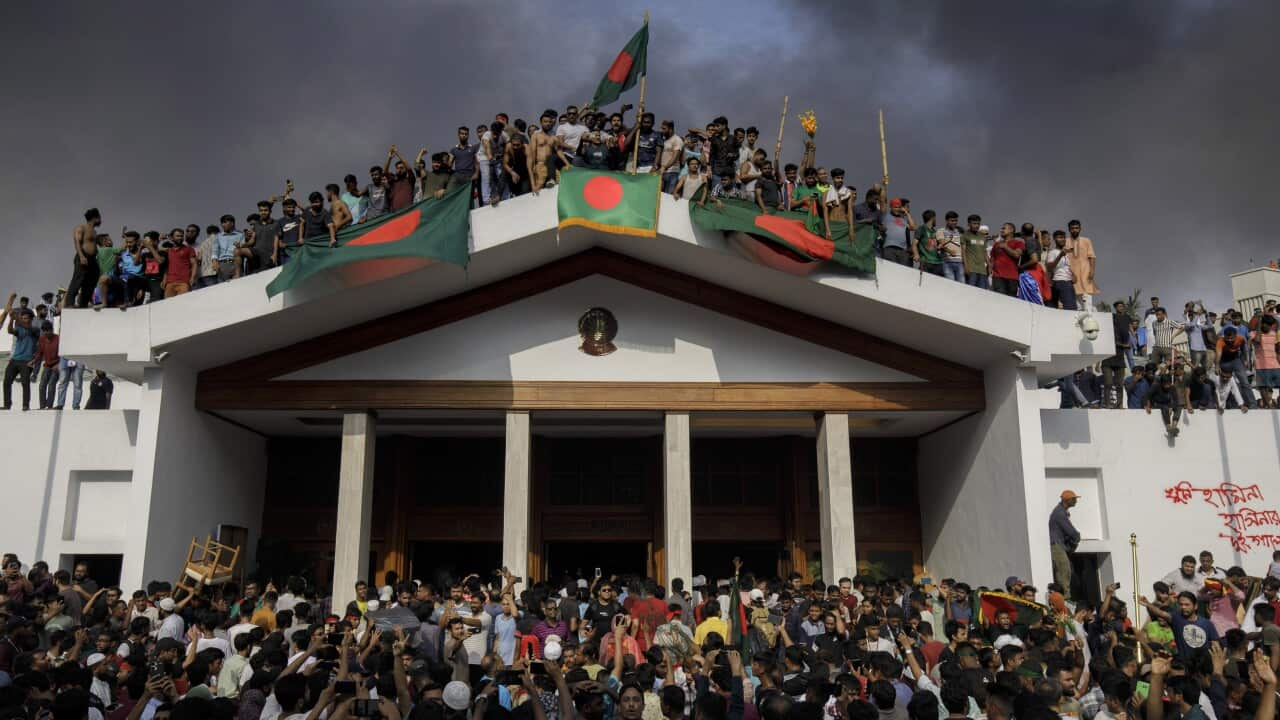Key Points
- Bangladesh Prime Minister Sheikh Hasina has resigned and fled the country.
- The country's army chief has said an interim government will be formed soon.
- Hasina's resignation follows weeks of violent protests in the country.
Bangladesh Prime Minister Sheikh Hasina has resigned and fled the country after hundreds of people were killed in a crackdown on demonstrations that began as protests against job quotas and swelled into a movement demanding her downfall.
Jubilant crowds stormed into the opulent grounds of the presidential residence unopposed, carrying out looted furniture and TVs.
One man balanced a red velvet, gilt-edged chair on his head.
Another held an armful of vases.
Elsewhere in Dhaka, protesters climbed atop a statue of Hasina's father, state founder Sheikh Mujibur Rahman, and began chiselling away at the head with an axe.
The flight into exile ended a 15-year second stint in power for Hasina, who has ruled for 20 of the last 30 years as leader of the political movement inherited from her father, assassinated with most of his family in a 1975 coup.
Hasina had left the country for her own safety at the insistence of her family, her son Sajeeb Wazed Joy told the BBC World Service.
Hasina was "so disappointed that after all her hard work, for a minority to rise up against her," Joy said.
She would not attempt to mount a political comeback, he said.
'A revolutionary period'
Earlier, army chief General Waker-Uz-Zaman announced Hasina's resignation in a televised address and said an interim government would be formed.
He said he had held talks with leaders of major political parties — excluding Hasina's long-ruling Awami League — and would soon meet President Mohammed Shahabuddin to discuss the way ahead.
"The country is going through a revolutionary period," said Zaman, 58, who had taken over as army chief only on 23 June.
"I promise you all, we will bring justice to all the murders and injustice. We request you to have faith in the army of the country," he said.
"Please don't go back to the path of violence and please return to non-violent and peaceful ways."

Police use tear gas to disperse student protestors. Source: AFP / /
Reuters could not verify this but commercial tracking services showed a Bangladesh Air Force plane had left the country and flown west before disappearing from tracking near Delhi.
Citing sources, ANI reported that India's National Security Adviser Ajit Doval and senior military officers met Hasina at the airfield and she was being moved to a safe location.
Bangladesh has been engulfed by violence since student protests last month against the quotas, which reserve some public sector jobs for veterans of the country's 1971 war of independence from Pakistan — seen as favouring allies of the ruling party.
The protests escalated into a campaign demanding the overthrow of Hasina, and were met by a violent crackdown in which about 250 people have been killed and thousands injured.
The country — once one of the fastest-growing economies in the world — has been plagued lately by slow economic growth, inflation and unemployment.

Bangladeshi students rallied on 3 August, calling for a nationwide civil disobedience campaign. Source: SIPA USA / Zabed Hasnain Chowdhury / SOPA Images
She had won a fourth straight term only in January this year in an election boycotted by the main opposition party, the Bangladesh Nationalist Party of her nemesis Begum Khaleda Zia.
Hasina had ruled since winning a decades-long power struggle with Zia in 2009.
The two women each inherited political movements from slain rulers — in Hasina's case, from her father Mujib; in Zia's case, from her husband Ziaur Rahman, who took power after Mujib's death and was himself assassinated in 1981.
"Hasina's resignation proves the power of the people," said Tarique Rahman, the exiled eldest son of the two Zias who now serves as acting chairman of the opposition party.
"Together, let's rebuild Bangladesh into a democratic and developed nation, where the rights and freedoms of all people are protected," he posted on X.
Student activists had called for a march to the capital Dhaka on Monday in defiance of a curfew to press Hasina to resign after clashes across the country on Sunday killed nearly 100 people.









